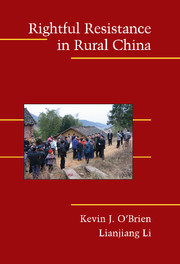Book contents
1 - RIGHTFUL RESISTANCE
Published online by Cambridge University Press: 05 September 2012
Summary
The words “popular resistance” typically bring to mind images of negation, usually of the legitimacy of something, and actions by people who lack recourse to institutional politics. When considering examples of popular resistance, we are drawn to accounts of marginalized workers and peasants rejecting the claims of political and economic elites – of efforts by the poor and weak to upset the plans of those with more power and status. Whether it is furtive, everyday resistance to changes in village norms and charitable practices, or open defiance of national rule, it is uninstitutionalized acts that spring from a deeply felt (if sometimes artfully undeclared) denial of legitimacy that tend to attract attention.
Much popular resistance surely fits this description. Struggles to tame political and economic power are often waged by the utterly excluded and rest on feelings of disavowal, even outrage. At the same time, however, other episodes of resistance exhibit a somewhat different logic. Contentious politics is not always a story of neatly divided antagonists, with representatives of the state or dominant classes posed on one side and members of the popular classes on the other. Sometimes resistance depends on the discontented locating and exploiting divisions within the state. In these circumstances, setting up subordinates (in society) in opposition to superordinates (in the state) can obscure how people actually go about warding off appropriation and political control.
- Type
- Chapter
- Information
- Rightful Resistance in Rural China , pp. 1 - 24Publisher: Cambridge University PressPrint publication year: 2006
- 3
- Cited by

